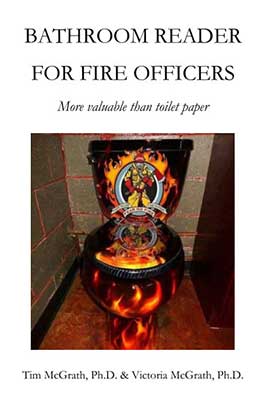We Simply Can't Afford It
by Dr. Tim McGrath & Dr. Victoria McGrath

With all the signs of economic problems confronting us, from the price of gasoline to foreclosure of homes, it absolutely amazes us that so many in the fire/EMS profession feel exempt, as if the fire/EMS profession were somehow a protected class. Powerful macroeconomic forces continue to grow stronger that have resulted in all organizations - both public and private - being faced with the need to: reduce costs; improve the quality of the services the citizens demand; and finding new ways to increase productivity, to mention but a few. Yet there are so many within this great profession that have taken the attitude of "if you don't like it, try calling 9-1-2".
In fairness the fire service has, for the most part, been able to escape all those reengineering, rightsizing, restrategizing, mergers, downsizing, quality initiative, flavor of the week, changes that we have all heard about for the last couple of decades. However, there are many that believe that the fire/EMS service, as we know it today, will price themselves out of business. Of course there will still be fires to be fought, as well as the sick and injured to be treated; however, it might be provided very differently than it is today. Thus, change will come from the outside; not internally, where we control some of our own destiny.
First, we must overcome the fear of rejection from our peers and have the courage to raise the red flag and enact meaningful change. This is a better solution than telling the elected officials that our ISO rating will go up prompting a mass exodus of citizens from our community equaling that attributed to Moses and the parting of the Red Sea. Difficult times require difficult solutions and most involve the pain of change.
A reasonable question would be, "I've heard this all before and yet little has changed in my world - why this time"? The answer might lie in the title of this article. Daily we are working with government agencies that simply can't afford the price tag of the services they provide. Yet we hear from numerous Fire Chiefs who take the position "but they can still afford that new lighting in the park". Yes, it is all about priorities and conventional wisdom would suggest that protection from fire and/or having an ambulance respond to your home is more important than park lighting. However, public desires and willingness to pay might not always align with your beliefs of how citizens should be protected. Remember that in order for those elected to govern, they must convince the voter they should be retained in office; to do this they must balance the desire of visible community services to that of invisible potential.
On the bright side, the public loves the fire service. On the downside, the fire service has portrayed themselves as heroes and remaining on that pedestal is an impossible task. It so often seems that if the fire service were to design a firing squad it would be a circle. The real challenge for today's fire service is how do leaders that recognize the dangers that lie ahead, create the needed sense of urgency that moves so many within the profession away from complacency. The bottom line is we don't change until the pain of protecting the status quo outweighs the pain of change, and the truth is that those in the public sector haven't felt the pain those in the private sector have; but it is coming.
We are about to spend four days at an International conference of City, Village, and Town managers. If the program, even in part, resembles what will most likely occur, the fire service will be painted as uncooperative, isolationist, and a force to be worked around in running their communities. My suggestion is to become part of the solution now while there is still time for your input. A few simple ideas (the list is far from all inclusive):
- Sharing a fire station verses two communities building, equipping, and staffing their "own" station located within one-half mile of each other
- Purchase joint apparatus - one ladder truck shared between several communities
- Joint purchasing with neighboring departments - from office supplies to apparatus
- Borderless response districts where only the closest unit responds regardless of whose district it is in
- Limiting the number of apparatus and mutual aid departments that respond to automatic fire alarms in a fully protected building with a sprinkler system
- Sharing a training officer, especially between departments that run mutual/automatic aid with each other
- Consolidation - the act of combining two or more fire departments into a single organization. Schools across the country have been forced (not voluntarily) to consolidate into a single larger district and the argument of "but we are unique" did not prevail
- Most importantly, have the courage to separate wants from needs in the budget process with the realization that the troops may not be happy
We are finding more and more communities that simply cannot afford their fire/EMS department and are/will reduce the fiscal burden through reduction of force, extend life of apparatus, consolidation, privatization, alternative staffing methods and a host of others. Remember in the end the rule of "he who has the gold makes the rules" is pretty accurate, and simply from our perspective, the supply of gold is diminishing.





